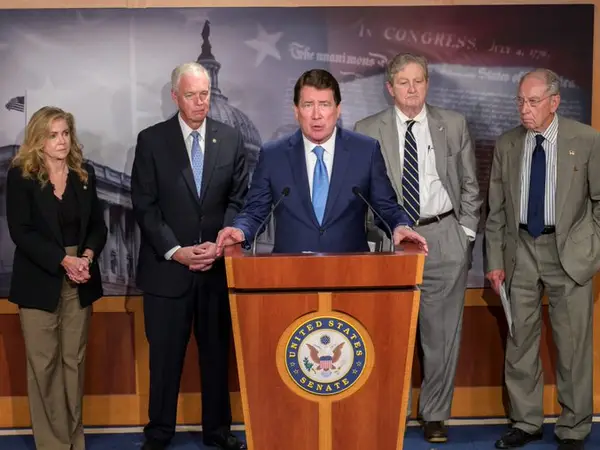Reports on a possible unwritten deal between Washington and the Iranian regime has led to multiple Congressional initiatives to ensure legislative oversight.
On Thursday 33 US senators joined to introduce the Iran Sanctions Relief Review Act (ISRRA – S.488) to “make it abundantly clear to the Biden Administration that any agreement made with Iran that involves sanctions relief must be submitted for Congressional review,” said Senator Bill Hagerty (R-Tenn) who leads the effort.
When in 2015 the JCPOA Iran nuclear deal with Iran was concluded, the Obama administration seeing serious opposition in Congress decided not to make it a treaty requiring Senate approval. As a tactic to reduce opposition, Obama agreed to the Iran Nuclear Agreement Review ACT (INARA) to allow Congress to oversee future dealings with Tehran, especially any reduction in sanctions.
As all signs point to indirect and even direct talks with the Islamic Republic emerge, many in Congress fear that the Biden administration is moving toward releasing Iran’s frozen funds in countries such as Iraq and South Korea, and possibly even sanctions in return for an Iranian pledge not to enrich uranium beyond 60 percent. Many lawmakers regard such a deal as harmful because Iran has already stockpiled enough enriched uranium to be able to quickly produce weapons-grade material if it decides to produce for nuclear weapons.
The Washington Free Beacon also reported on Thursday that Republicans in the House of Representatives are preparing to subpoena top Biden administration officials over the secret talks with Iran. The effort is led by the Republican Study Committee, the largest conservative caucus in the US Congress. The group intends to subpoena Iran envoy Robert Malley and White House national security aide Brett McGurk, both seen as key players in ongoing secret talks with the Islamic Republic.
At same time, more than 200 prominent Iranian Americans have written to Rep. Michael McCaul, Chairman of the House Foreign Affairs Committee asking him to subpoena US special envoy for Iran Robert Malley, who is deeply distrusted by Iranian activists and others opposed to the Iranian regime.
“We therefore implore you to subpoena Mr. Malley to provide, under oath and in a public hearing, a rundown of what has been agreed upon with the regime,” the letter asked Rep. McCaul, and added, “We consider access to and knowledge of this information to be unalienable right of the American people and our community, as our friends and families inside Iran suffer under the tyranny and brutality of the Islamic Republic regime.”
Some prominent signatories were; Reza Behrouz, physician and Professor at the University of Texas ; Yass Alizadeh, Assistant Professor of Persian language and literature at New York University; Atlanta-based attorney Sasan Nematbakhsh; DC-based legal scholar Shima Bozorgi; Amin Sophiamehr, philosophy instructor from Indiana University and Sara Eshaghi of the California-based group, “Action for Iran.”
This week, a bipartisan group of 26 senators sent a letter to the White House expressing concern over reports that the administration is trying to reach a limited deal with Iran without Congressional oversight.
“It is imperative today that we strengthen our efforts to deter Iran from achieving nuclear weapons capability. We must make Iran understand, in no uncertain terms, that further advances in its nuclear program will be met with unified international action,” the 26 senators wrote to Biden.
“It is crucial for your administration to remain aligned with Congressional efforts related to Iran’s nuclear program and not agree to a pact that fails to achieve our nation’s critical interests,” the letter said.
